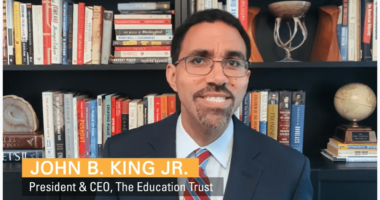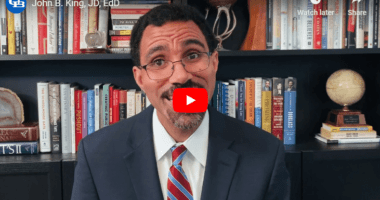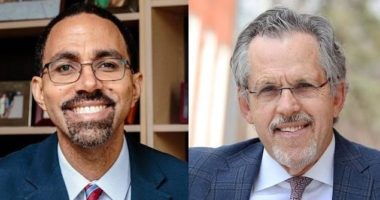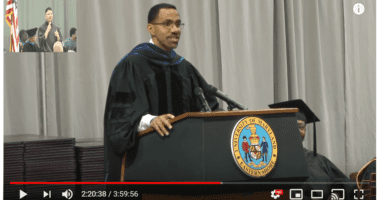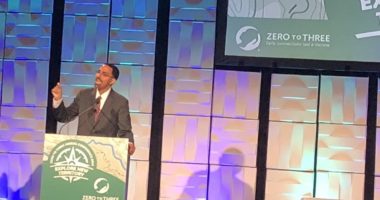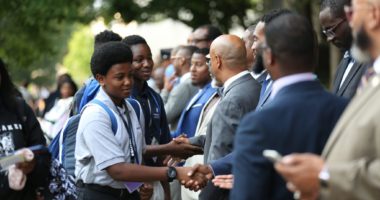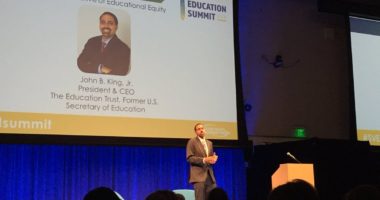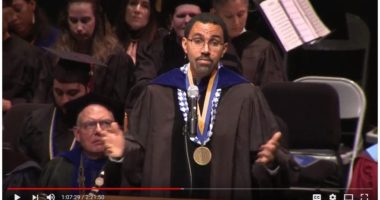John B. King Speaks to the Class of 2017 at Howard University’s Graduate School of Education
In Washington, D.C., John King spoke to graduates of the Howard University School of Education, and urged them, as current and future educators, to lead with their legacy in mind and to be fierce champions of equity and excellence for all students.
Thank you, De’Lon, for the introduction. To Dean Williams, President Frederick, the Board of Trustees, and faculty at the School of Education, thank you for the honor of celebrating this day with you.
To the graduates, congratulations on earning your degrees! You set your sights on a mighty goal and you achieved it. But, you did not do it alone. Family members, spouses, mentors, and friends supported and encouraged you along your path. They share in your sense of pride and accomplishment.
One of the most powerful means of honoring the people who helped make this day possible is through the careers that you will pursue in public service.
One of the truest, most sincere forms of giving thanks is giving back. That sense is captured in this University’s motto, “veritas et utilitas”—truth and service.
And you are graduating at a time when our nation needs you.
Our nation needs every ounce of knowledge you learned here; every skill you developed through service learning, internships, and student teaching; and all of your passion and energy. Our nation needs you to devote these things and your whole hearts to the cause of expanding equity and opportunity.
Today, a child’s zip code, the color of his skin, the language he speaks at home, and the income of his family all weigh too heavily in the determination of that child’s future.
Now, perhaps more than ever before, an excellent education is vital to individual prosperity, the health of our democracy, and the strength of our nation.
But, as you know, far too many young people—especially those who are most vulnerable—do not have access to the opportunities that a great education makes possible.
Children of color and low-income students often have the least access to quality preschool, high academic expectations, and safe schools. They often are cut off from challenging coursework and outstanding teachers. They are suspended, expelled, and drop out of school at higher rates than their peers. And they are less likely to make it to post-secondary success, as all of you have.
As a nation, we have much work to do. But your work—in education and public service—will help our nation to more fully realize its promise of equal opportunity. Your work will help America truly become a place where every child—regardless of race, background, or circumstance—can go as far as her dreams and determination can take her.
So, today, as you graduate, I want to encourage you to use the education you received here at Howard to help us achieve this aim. And I will suggest three powerful ways to do it: teach for social justice, see and love the whole child, and lead with your legacy in mind.
Now, your education, and maybe your personal experiences, have shown you that inequities in schools reflect broader, continuing struggles in our communities and our country.
You have seen that systemic biases, xenophobia, sexism, racism, and structural obstacles stand in the way of opportunity.
Indeed, when we bear witness to events like the water crisis in Flint and the shooting deaths of unarmed Black men, women, and youth at the hands of police in too many U.S. cities to count, we are reminded of the work that still needs to be done. When we hear talk of bans and border walls we are reminded our country still grapples with deep intolerance. When we observe a growing chasm of income inequality across the nation, crumbling schools in Detroit, and a school-to-prison pipeline that shuttles people of color from under-resourced schools into over-crowded jails, we are reminded of the justice that still eludes us.
To be sure, we are in the midst of a new era in the struggle for civil rights.
This University’s legacy in the movement stretches back 150 years to its founding, two years after the Civil War ended and four years after President Lincoln issued the Emancipation Proclamation.
That legacy continues with you. That legacy lives on in others when you teach for social justice.
Teaching for social justice means nurturing in your students social consciousness—an awareness of the things that still need solving in our communities and in our country—even as you help students build a strong foundation in academic learning.
It means helping students develop the skills to become activists for issues that they care about through service learning and by helping them to understand how our government, our democracy, and our social systems function.
It means teaching students the history of resistance to slavery and of the civil rights movement, about Black authors, scientists, inventors, and artists, and reminding them that they stand on the shoulders of giants who came before them.
It means inspiring students to become the next Dr. Martin Luther King, Jr., Rosa Parks, Cesar Chavez, Audre Lorde, and Thurgood Marshall. And it means empowering them to become the next Brittany Packnett or DeRay McKesson.
You can teach for social justice whether you choose to be a teacher, a principal, a counselor—whether you are a parent, a caregiver, or a mentor.
Indeed, here at Howard, you are an academic community bound together by the ideal of social justice—and by your drive to expand equity and opportunity through education.
This school’s acclaimed early learning program is giving children—many of whom face challenging circumstances—a strong start. Your Journal of Negro Education—the oldest continuously published journal about Black people—is contributing to the research base on how Black children achieve. Your groundbreaking research is showing ways to improve underperforming urban schools.
And, through partnerships with organizations including The Education Trust—which I am proud to lead—the School of Education just developed a first-of-its kind doctoral program focused on Minority Serving Institutions.
In all of this work, Howard places advocacy at the center. That means, to use a phrase from U.S. Congressman and civil rights icon, John Lewis, that you are prepared to make “good trouble.” In the context of education, “good trouble” is about being a champion of children and using your loudest, most persistent voice to advocate for what all students need to achieve their potential.
When I think of this work in action, I think of one of your alums, Dr. Andrae Townsel—a three-time Howard graduate.
Andrae recently was appointed principal of Southbridge High School in Massachusetts and is leading the school’s turnaround as one of the lowest-performing high schools in the state. He is the first African-American principal at Southbridge High. He is teaching for social justice because he already has shaken up the status quo.
Andrae forged new partnerships with the local airport and flight school to give Southbridge students the opportunity to earn college credits while they study aviation. Literally and figuratively, Andrae is helping his students to fly.
Through education, lives can be uplifted, transformed, and even saved—which brings me to my next suggestion for you as you build your careers. And that is to see and love the whole child.
So many students experience tremendous adversity. Poverty. Poor health. Violence. Hunger. Addiction. Difficult family circumstances. I want to challenge you to see those things. Really see those things. Look at them dead-on and don’t let them lull you into softening your fierce belief in your students’ potential.
Work to understand what your students may be struggling with at home. And even as you identify those struggles, seek to understand your students’ strengths. Build your students’ assets into how you reach them and how you teach them.
Your education at Howard has shown you that students’ success in school is dependent upon more than high expectations and great teaching, although both are important. You know that success also requires creating systems to ensure no student falls through the cracks; making sure students attend school regularly, despite challenges they may face; and meeting young people’s social, emotional, and behavioral needs in schools and classrooms that are welcoming and safe. It also often requires connecting students with wraparound services from health clinics to transitional housing.
Great educators who see and love the whole child—even and especially the challenging parts of that child’s life—can make all the difference.
I know this from personal experience. My mom passed away when I was eight, my dad when I was twelve. During the years when I lived with my dad, he struggled with undiagnosed Alzheimer’s. Home life was scary and unpredictable. I did not know what my dad would be like from one night to the next. And as he got more and more sick, I took on more and more responsibility for figuring out how to get the bills paid, how to get food, and how to keep the household functioning. But throughout that period, school—and my New York City public school teachers—provided a refuge. They created a space where I felt safe, challenged, and engaged—where I could be a kid when I couldn’t be a kid outside of school.
Now, no life is a straight line. After my dad passed, I moved around between family members and schools. Although I was a good student and I was accepted to boarding school as a teenager, I struggled with the losses I experienced in my youth. I was angry. I made bad choices and got kicked out of high school. I often say I was the first Secretary of Education to have been kicked out of high school, but I hope I won’t be the last.
After I got kicked out, I was again fortunate to have public school teachers and mentors who chose to invest in me. They could have looked at me as an African-American, Latino male with a family in crisis who had gotten in trouble at school; and they could have written me off, as too often happens to many students. But, instead they saw my potential. They gave me hope for the future.
I know many of you will encounter a young person with a story like mine. I know because of the education you received at Howard that you will see the promise in that child.
As I look out at all of you today, I am filled with confidence that you are exactly who our young people need. And that brings me to my final piece of advice for you—lead with your legacy in mind.
Today, a majority of our public school students are students of color. Yet, only 18 percent of teachers in America are teachers of color. Only 2 percent of our teachers are African-American men.
But we know how powerful it can be for African-American children to have African-American teachers. In fact, a new study shows that low-income Black students who have a Black teacher for at least one year in elementary school are less likely to drop out of high school and more likely to consider college.
The Education Trust, through the research of Dr. Ashley Griffin, who is here today, reveals one of the reasons why Black children may benefit from Black teachers. According to Dr. Griffin’s findings, Black teachers often feel an obligation, which they say is intensified by their limited representation in the profession, to go beyond academics to educate the whole child. This means many Black teachers make it a priority to help children build resilience and develop life skills, which can help children in the classroom and beyond.
So, even as you embark on your own careers in education, help your students envision themselves as teachers, school leaders, and counselors. Mentor other educators of color. Push your schools and districts to recruit and retain diverse educators by sitting on interview panels and standing up for the supports those educators need once they are hired. If you nurture the next generation of educators of color, you’ll be leading with your legacy in mind. And here is one powerful reason why:
I am convinced, if all our children—including white students—regularly encountered educators of color in their schools and if they were able to learn next to classmates who were different from themselves, the conflicts in this country over race, religion, and language would be profoundly diminished. Making our nation a more tolerant place, then, is part of the legacy you’ll leave behind.
In teaching for social justice, seeing and loving the whole child, and leading with your legacy in mind, all of you will experience the deepest meaning of a life lived in service to others. You will nurture the promise of our young people. And you will help transform the hope of the American Dream into a reality for every young person whom your work touches.
Thank you for everything you have done and will continue to do for children. Congratulations!

